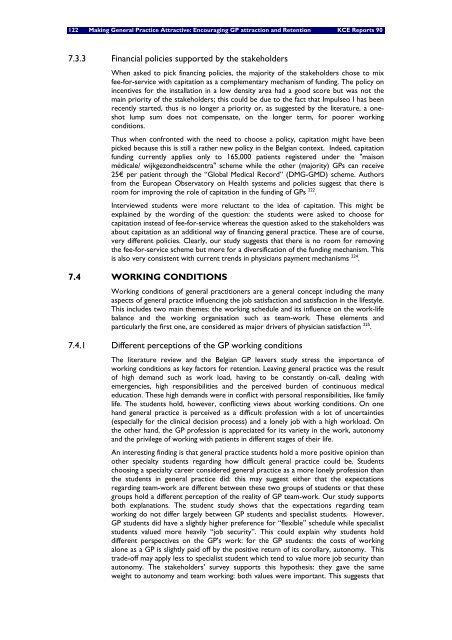Download the report (150 p.) - KCE
Download the report (150 p.) - KCE
Download the report (150 p.) - KCE
Create successful ePaper yourself
Turn your PDF publications into a flip-book with our unique Google optimized e-Paper software.
122 Making General Practice Attractive: Encouraging GP attraction and Retention <strong>KCE</strong> Reports 90<br />
7.3.3 Financial policies supported by <strong>the</strong> stakeholders<br />
When asked to pick financing policies, <strong>the</strong> majority of <strong>the</strong> stakeholders chose to mix<br />
fee-for-service with capitation as a complementary mechanism of funding. The policy on<br />
incentives for <strong>the</strong> installation in a low density area had a good score but was not <strong>the</strong><br />
main priority of <strong>the</strong> stakeholders; this could be due to <strong>the</strong> fact that Impulseo I has been<br />
recently started, thus is no longer a priority or, as suggested by <strong>the</strong> literature, a oneshot<br />
lump sum does not compensate, on <strong>the</strong> longer term, for poorer working<br />
conditions.<br />
Thus when confronted with <strong>the</strong> need to choose a policy, capitation might have been<br />
picked because this is still a ra<strong>the</strong>r new policy in <strong>the</strong> Belgian context. Indeed, capitation<br />
funding currently applies only to 165,000 patients registered under <strong>the</strong> "maison<br />
médicale/ wijkgezondheidscentra" scheme while <strong>the</strong> o<strong>the</strong>r (majority) GPs can receive<br />
25€ per patient through <strong>the</strong> “Global Medical Record” (DMG-GMD) scheme. Authors<br />
from <strong>the</strong> European Observatory on Health systems and policies suggest that <strong>the</strong>re is<br />
room for improving <strong>the</strong> role of capitation in <strong>the</strong> funding of GPs 222 .<br />
Interviewed students were more reluctant to <strong>the</strong> idea of capitation. This might be<br />
explained by <strong>the</strong> wording of <strong>the</strong> question: <strong>the</strong> students were asked to choose for<br />
capitation instead of fee-for-service whereas <strong>the</strong> question asked to <strong>the</strong> stakeholders was<br />
about capitation as an additional way of financing general practice. These are of course,<br />
very different policies. Clearly, our study suggests that <strong>the</strong>re is no room for removing<br />
<strong>the</strong> fee-for-service scheme but more for a diversification of <strong>the</strong> funding mechanism. This<br />
is also very consistent with current trends in physicians payment mechanisms 224 .<br />
7.4 WORKING CONDITIONS<br />
Working conditions of general practitioners are a general concept including <strong>the</strong> many<br />
aspects of general practice influencing <strong>the</strong> job satisfaction and satisfaction in <strong>the</strong> lifestyle.<br />
This includes two main <strong>the</strong>mes: <strong>the</strong> working schedule and its influence on <strong>the</strong> work-life<br />
balance and <strong>the</strong> working organisation such as team-work. These elements and<br />
particularly <strong>the</strong> first one, are considered as major drivers of physician satisfaction 225 .<br />
7.4.1 Different perceptions of <strong>the</strong> GP working conditions<br />
The literature review and <strong>the</strong> Belgian GP leavers study stress <strong>the</strong> importance of<br />
working conditions as key factors for retention. Leaving general practice was <strong>the</strong> result<br />
of high demand such as work load, having to be constantly on-call, dealing with<br />
emergencies, high responsibilities and <strong>the</strong> perceived burden of continuous medical<br />
education. These high demands were in conflict with personal responsibilities, like family<br />
life. The students hold, however, conflicting views about working conditions. On one<br />
hand general practice is perceived as a difficult profession with a lot of uncertainties<br />
(especially for <strong>the</strong> clinical decision process) and a lonely job with a high workload. On<br />
<strong>the</strong> o<strong>the</strong>r hand, <strong>the</strong> GP profession is appreciated for its variety in <strong>the</strong> work, autonomy<br />
and <strong>the</strong> privilege of working with patients in different stages of <strong>the</strong>ir life.<br />
An interesting finding is that general practice students hold a more positive opinion than<br />
o<strong>the</strong>r specialty students regarding how difficult general practice could be. Students<br />
choosing a specialty career considered general practice as a more lonely profession than<br />
<strong>the</strong> students in general practice did: this may suggest ei<strong>the</strong>r that <strong>the</strong> expectations<br />
regarding team-work are different between <strong>the</strong>se two groups of students or that <strong>the</strong>se<br />
groups hold a different perception of <strong>the</strong> reality of GP team-work. Our study supports<br />
both explanations. The student study shows that <strong>the</strong> expectations regarding team<br />
working do not differ largely between GP students and specialist students. However,<br />
GP students did have a slightly higher preference for “flexible” schedule while specialist<br />
students valued more heavily “job security”. This could explain why students hold<br />
different perspectives on <strong>the</strong> GP’s work: for <strong>the</strong> GP students: <strong>the</strong> costs of working<br />
alone as a GP is slightly paid off by <strong>the</strong> positive return of its corollary, autonomy. This<br />
trade-off may apply less to specialist student which tend to value more job security than<br />
autonomy. The stakeholders' survey supports this hypo<strong>the</strong>sis: <strong>the</strong>y gave <strong>the</strong> same<br />
weight to autonomy and team working: both values were important. This suggests that
















